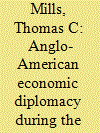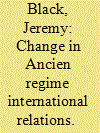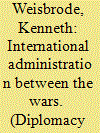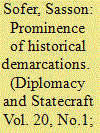| Srl | Item |
| 1 |
ID:
088126


|
|
|
|
|
| Publication |
2009.
|
| Summary/Abstract |
Throughout the Second World War British and American companies competed to gain the contract for the electrification of the central Brazilian railway. The British Foreign Office used this case to establish a broader principle with the U.S. government that the conditions brought about by war would not be used by one country to gain commercial advantage at the expense of the other. While the U.S. government supported this principle in theory, this article argues that they failed to adhere to it in practice. U.S. actions in this case shed new light on the country's economic diplomacy with Britain during the Second World War.
|
|
|
|
|
|
|
|
|
|
|
|
|
|
|
|
| 2 |
ID:
088127


|
|
|
|
|
| Publication |
2009.
|
| Summary/Abstract |
This article examines the strategies pursued by the Australian Liberal-Country Party coalition governments of Robert Menzies and Harold Holt in their quest to secure a continuing British military presence in Malaysia and Singapore. It focuses on the first eighteen months of the Wilson premiership (October 1964-March 1966) when Labour's thinking on the future of Britain's defence role east of Suez was still fluid and had not yet crystallised into a firm decision to withdraw from "east of Suez." In doing so, the article considers whether both Menzies and Holt did all they could to encourage London to remain politically and militarily engaged in Southeast Asia. In addressing this question, this study provides an interesting insight into the conduct of post-war Australian foreign policy and the management of Australia's relations with its major allies, the United States and Britain.
|
|
|
|
|
|
|
|
|
|
|
|
|
|
|
|
| 3 |
ID:
088123


|
|
|
|
|
| Publication |
2009.
|
| Summary/Abstract |
Mapping became an important element in the mechanics of European diplomacy in the century and one-half after the Peace of Westphalia. This element was linked to what has been seen as a more defined notion of frontiers, a move away from the idea of a frontier as a zone to, instead, the idea of a distinct border that could be reproduced and charted on a map as a line. This change reflected a greater stress on undivided sovereignty, which made ambiguous relationships, such as that between France and ten Alsatian cities established by the Peace of Westphalia of 1648, unacceptable to some rulers. However, traditional ideas proved to be very persistent and mapping often served simply to clarify the existence of incompatible notions and disputed territories.
|
|
|
|
|
|
|
|
|
|
|
|
|
|
|
|
| 4 |
ID:
088128


|
|
|
|
|
| Publication |
2009.
|
| Summary/Abstract |
The adoption of the Inter-American Democratic Charter by the Organization of American States in 2001 proclaiming the right to democracy in the western hemisphere was hailed by many as a landmark development. Since then, however, constitutionally dubious transitions of democratically elected governments were attempted or took place in Venezuela, Haiti, and Ecuador. This paper examines whether the Charter can and should serve as the institutional guarantor of democratic legitimacy in the Americas. Its conclusions are skeptical. As an external instrument, the Charter is bound to have limited impact when government control or authority is subjected to significant domestic disruptions. The Charter's limitations do not lie with the document itself; rather they are inherent in the structure of the international states system. But the Charter's normative basis would be problematic even if these structural limitations did not exist. Taking its cue from the classical liberal approach to international relations, the paper argues that democracy must ultimately be the choice and responsibility of those who live within its bounds, and not of outside governments or institutions.
|
|
|
|
|
|
|
|
|
|
|
|
|
|
|
|
| 5 |
ID:
088124


|
|
|
|
|
| Publication |
2009.
|
| Summary/Abstract |
This article traces the chronology of the interwar decline of European influence and power, arguing that its origins outside Europe are to be found as much in the paradoxical status of international administration of colonial and post-colonial areas as in the direct challenges posed to European stability by revisionist states in the early 1930s. It demonstrates that an inherent ambivalence toward the interwar colonial world and its relationship to Europe presaged and conditioned the collapse of Europe's own balance of power.
|
|
|
|
|
|
|
|
|
|
|
|
|
|
|
|
| 6 |
ID:
088129


|
|
|
|
|
| Publication |
2009.
|
| Summary/Abstract |
Between 1944 and 2002, the United States sought to create a competitive and commercially driven international civil aviation regime. It tried to peel away politically inspired regulations, which fragmented the marketplace, and deliver efficiencies and consumer benefits. In contrast with the American liberal tradition-albeit with limitations-the industry in Europe was over-regulated and largely based on subsidised state-owned carriers with international market quotas. Thus for many years Europe and the U.S. followed different paths; but political and economic dynamics conspired together in the 1980s and early 1990s to produce remarkable change in the European Community and, by 1997, there were the makings of a competitive and lightly regulated single market, which brought it close to U.S. practice. Since 2002, the United States has been less liberal in its airline policies; the EU has been more liberal. It would be an irony indeed if the great regime liberaliser since 1944 were now to become a force of regulatory conservatism that denied consummation to the vision of a transatlantic open aviation area that could be a magnet to draw in the rest of the world into a truly global commercial airline market.
|
|
|
|
|
|
|
|
|
|
|
|
|
|
|
|
| 7 |
ID:
088125


|
|
|
|
|
| Publication |
2009.
|
| Summary/Abstract |
American policy toward Germany in the years before Pearl Harbor can be approached from any number of angles. A rich literature already exists that emphasizes the geopolitical dimension of the German-U.S. relationship, as well as its economic and ideological complexities. I shall here explore an interpretative line that has been less fully developed in the historiography, namely, the viewpoint of U.S. diplomats posted in Berlin. Their experience in the 1930s throws into vivid relief the dilemmas posed by the Third Reich to FDR's America and its equivocal response.
|
|
|
|
|
|
|
|
|
|
|
|
|
|
|
|
| 8 |
ID:
088122


|
|
|
|
|
| Publication |
2009.
|
| Summary/Abstract |
It came as no surprise that interest in the temporal dimension of international politics was on the rise at the turn of the millennium. Of no less importance is the prospect for a "historical turn" in international relations theory. This paper attempts to clarify the relationship between historical demarcation and international understanding of epochal change, and the transformation of world order. Two momentous historical demarcations are examined: the Peace of Westphalia, and the New World Order. The paper offers two propositions. First, that the year 1648 remains the most appropriate historical moment to demarcate the beginning of the Westphalian order, and that the attempt to push the historical demarcation to either the late Renaissance, or the nineteenth century, is theoretically and historically counterproductive. Secondly, that the New World Order of 1989-1992 is only the beginning of a transitory period in history with no conclusive shape or substance, and that the term post-Westphalian order is premature.
|
|
|
|
|
|
|
|
|
|
|
|
|
|
|
|